‘An Amazing Story’
Rare Disease Patient Finds Renewed Hope at NIH
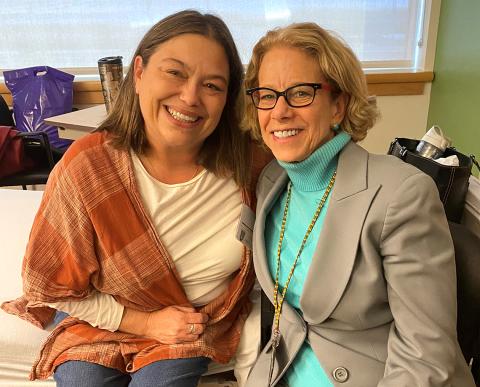
Living with a rare disease can cause ongoing emotional distress. So much about a rare disease and its progression remains uncertain; treatments and dosing are often experimental. And, it can be tough finding someone knowledgeable enough about the disease to provide reliable, specialized care.
April Murphy, 46, has a rare genetic disorder called methylmalonic acidemia (MMA), a life-threatening metabolic condition that causes severe episodes of illness and long-term complications. Murphy currently is in end-stage renal failure, awaiting a kidney transplant. Despite her condition, she considers herself fortunate.
She visited NIH for the first time in January, when she met NHGRI senior investigator and MMA expert Dr. Charles Venditti, and reconnected with NICHD director Dr. Diana Bianchi, who had counseled and treated her and her mother for an unrelated genetic condition two decades earlier.
“As somebody who works with doctors daily,” said Murphy, a surgical assistant in Williamsburg, Va., “what NIH doctors do is not a job to them. It’s so much more. They put 110 percent of themselves into what they do to take care of people, and you don’t find that everywhere.”
First Fetal Patient
Murphy’s luck began before she was born. Growing up in the Boston area, she auspiciously came under the care of Dr. Mary Ampola, a biochemical geneticist at Tufts-New England Medical Center, who first treated Murphy in her mother’s womb.
Incredibly, just a few years before Murphy was born, a researcher determined that some patients with MMA responded to large amounts of vitamin B12 (cobalamin). That discovery inspired Ampola to try a revolutionary treatment after amniocentesis confirmed that Murphy had inherited the vitamin-responsive type of MMA.
In 1973, with support from NIH and March of Dimes grants, Murphy’s mother received oral, then intramuscular injections of cobalamin for the last 2 months of pregnancy; the vitamin entered the placenta to treat baby April. The groundbreaking case was reported in 1975 in the New England Journal of Medicine.
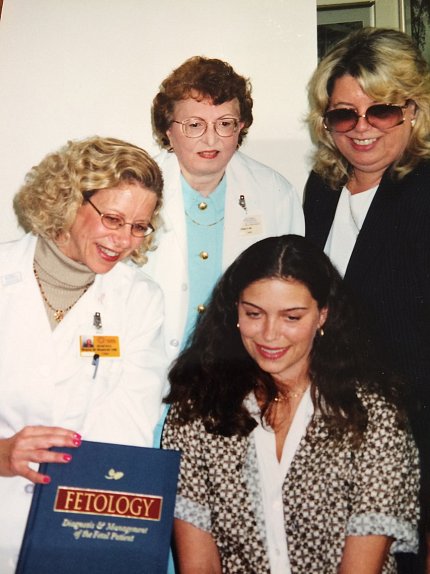
“From my perspective,” said Bianchi, who first met Murphy in 1999 through Ampola, then her colleague at Tufts, “as someone interested in prenatal testing and field treatment, April is really a very special and legendary person because she was the first person ever to be treated in utero for a genetic disorder.”
At that time, MMA patients didn’t get diagnosed until symptoms appeared in infancy or later in childhood. In Murphy’s case, a family tragedy saved her life. Her older sister died at age 3 months. Posthumous testing revealed that her sibling had MMA. While the condition is now routinely tested as part of newborn screening, it’s still unusual to make a prenatal diagnosis.
“The cobalamin-A form of the disorder, what April has, within the spectrum of MMA is considered milder,” said Venditti, “but it’s still extremely dangerous…With this type, there’s a partial response to B12, but if a patient doesn’t get enough vitamin, he or she can go into a coma or have other serious complications.”
Lucky in Life
Growing up, Murphy had a normal childhood. She logged her diet daily, knew her limitations and took full responsibility for managing her condition, all under the supportive watch of Ampola. Murphy did have some scares, and was hospitalized a few times for metabolic acidosis, but quickly recovered.
She has taken hydroxocobalamin most of her life. Terrified of needles, she’d squirt the liquid vitamin into ginger ale. Drinking the elixir daily maintained her methylmalonic acid levels.
After high school, Murphy gave birth to a healthy daughter, and now has two grandchildren. Her daughter, as well as her two younger sisters, are MMA carriers but none of them have the recessive disorder.

As an adult looking back, Murphy is grateful for the meticulous care she received, and the experimental prenatal treatment that contributed to her better outcome at birth and beyond.
“Doctors have told me, after all my testing, that there could have been neurocognitive damage, possibly physical issues,” said Murphy, “so it really made a difference that they [gave my mother the B12] in utero versus waiting until I was born.”
A Genetic Scare
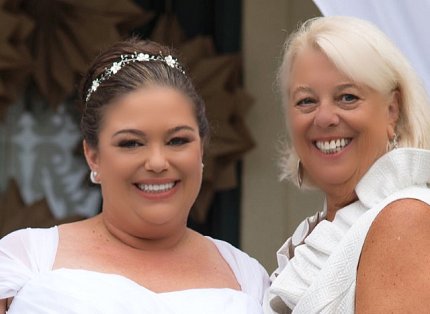
Twenty years ago, Murphy and her mother met with Bianchi, who was launching a genetic research project at Tufts-New England Medical Center on cancer in families. Murphy’s mother had survived breast and ovarian cancer and today remains cancer-free. Bianchi would counsel and treat them after they both tested positive for the BRCA gene.
“I come from a long line of strong women,” said Murphy, undeterred by the diagnosis. “It was great to find out so early on so that I could make decisions for my future before anything happened.”
Ten years ago, a preventative oophorectomy sent Murphy into early menopause. The accompanying extreme fatigue lasted an unusually long time. It turned out, the fatigue was caused by dangerously high acid levels, which would take years to stabilize. A nephrologist later diagnosed her with end-stage renal failure.
Toward New MMA Treatments
NHGRI’s Venditti has devoted much of his career to studying MMA. He began seeing patients in 1999 while a genetics fellow at Children’s Hospital of Philadelphia. Doctors tried to discourage him from working on MMA, arguing that it wasn’t treatable, but, encouraged by many parents, he was determined to find better therapies.
“Now we have a lot more options for the patients and I really think it won’t be long until we have gene therapy,” said Venditti. “We’re going to get this to work.”
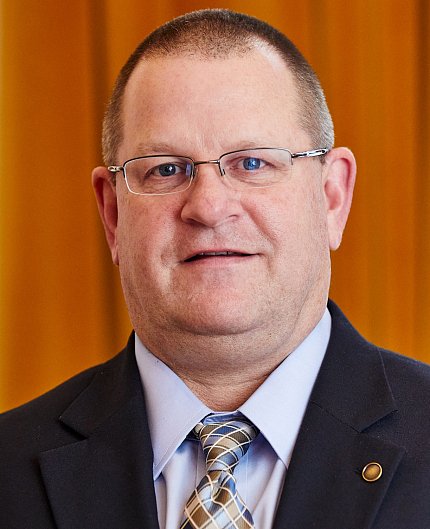
He and his colleagues at NHGRI have teamed up with several biotech companies and are developing promising new genomic therapies for MMA. He also oversees an MMA natural history study in the Clinical Center that has enrolled more than 200 patients; Murphy is the newest member of the cohort.
“One needs to understand the natural history of MMA before a new treatment is tested,” said Venditti, “and answer the questions of what the effects will be downstream on the patient.” The NHGRI natural history study helps track metabolic parameters, nutrition patterns, bone phenotypes, symptoms over time, genetic effects and, in concert with lab work, has identified new biomarkers for treatment.
“I counseled April more than 20 years ago,” said Bianchi, “but to see her again, it’s such a privilege because you get that long-term perspective. It’s an amazing story because it’s a rare but treatable genetic disorder, and there have been a lot of advances that really translate to patient care.”
Looking Ahead
During Murphy’s recent NIH visit, Venditti and his NHGRI team members Dr. Irini Manoli and Dr. Jennifer Sloan reassured her that renal failure was a consequence of MMA and that there was nothing she could have done to stop the progression. She also came away comforted that NIH doctors and resources are just a few hours from home.
Murphy is scheduled for a kidney transplant this spring. Neither sister was a match, so she and her wife are participating in a kidney swap program. Murphy is otherwise deemed in good health and optimistic about the future.
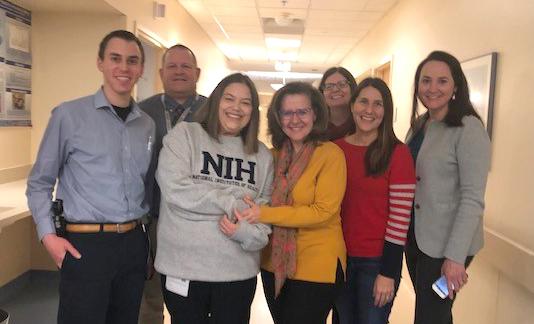
“In Massachusetts, I grew up my whole life having Dr. Ampola as my hero, always there to take care of me,” said Murphy. “When I moved to Virginia, there was an emotional loss. It was hard to find anyone to take care of me here who knew anything about MMA.”
She worried about where she’d turn if her condition changed or if she had any sort of emergency. “Daily life here, medically, has been a scary thing. But…now I have Dr. Bianchi and Drs. Venditti and Manoli and the MMA team in Bethesda. If anything should go wrong, I have people I can count on to take care of me.”
In tears, Murphy added, “It really makes the biggest difference in my life. You guys truly are the superheroes of medicine.”
